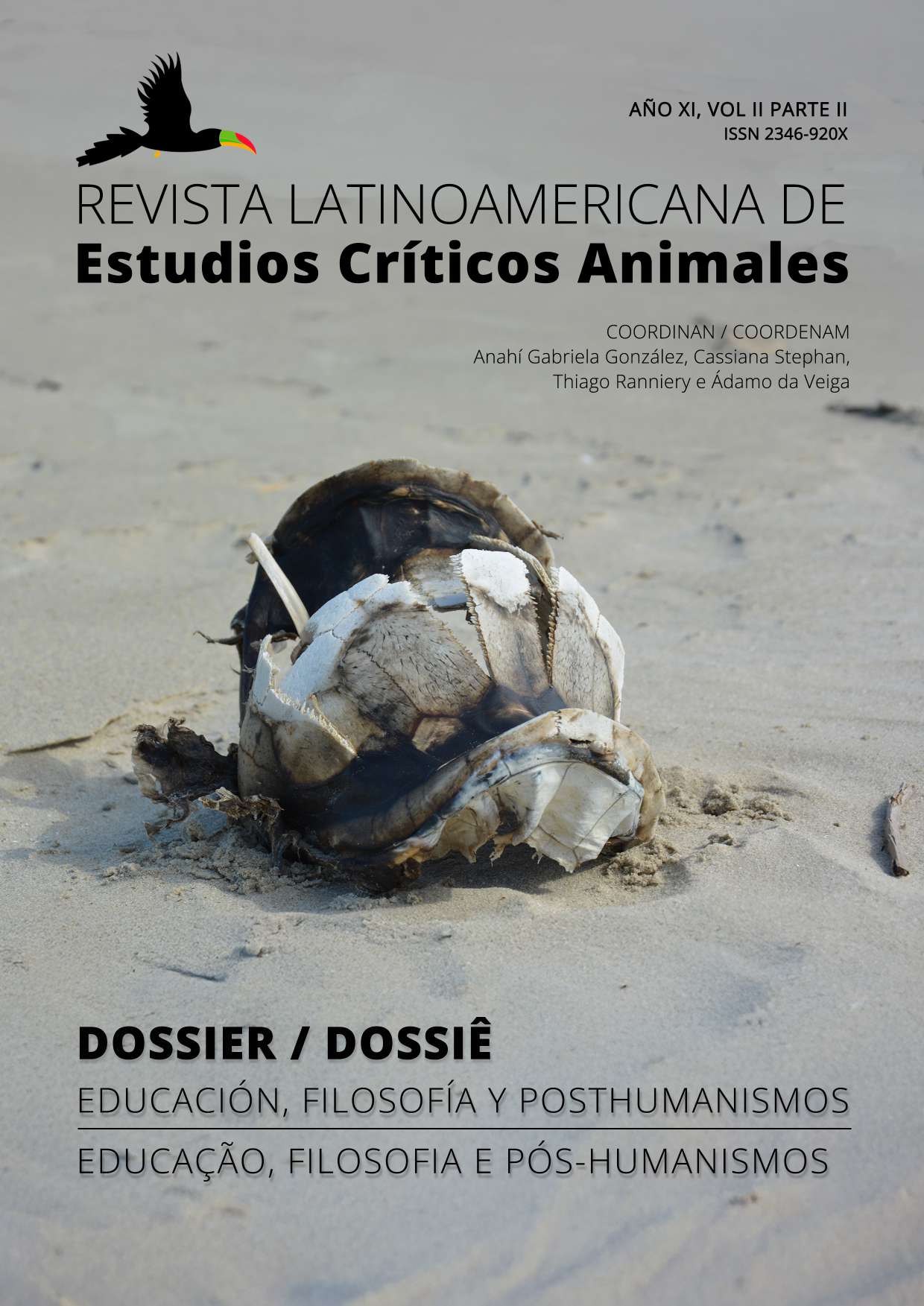Since the Anguish of the Stars...: Counter-hegemonic educational possibilities from vital materialism
Keywords:
vital materialism, vibrant matter, relational ontology, educationAbstract
In this article, we draw on Jane Bennett's vital materialism to consider counter-hegemonic curricular and educational alternatives. By suspending the boundary between human and nature and establishing a relational ontology, we aim, on the one hand, to highlight the deconstruction of modern ideals that defined the subject as rational, conscious, centered, identical, and unitary, and, on the other hand, to propose alternatives for curricular and educational thought, no longer based on the notion of the "subject," but on the understanding of existence as a network of vibrant materials and things-power that, intertwined, form diverse assemblages.
References
Aristóteles (1999). Política. Trad. Therezinha Abrão. São Paulo: Nova Cultural
Barad, K. (2007). Meeting the universe halfway: quantum physics and the entanglement of matter and meaning. Durham: Duke University Press.
Bennett, J. (2010). Vibrant matter: a political ecology of things. Durham; London: Duke University Press
Bogost, I. (2012). Alien Phenomenology. Minneapolis: University of Minesota Press, 2012
Borges, V.; Lopes, A. C. (2021). Por que o afeto é importante para a política? Implicações teórico-estratégicas. Bahia: Práxis educacional, v. 17, n. 48, out/dez 2021, pp. 114-135
Christian, D. (2015). Is anyone in charge of this thing?. In: BROCKMAN, J. (Org.) What to think about machines that think. New York: Harper Collins
De Landa, M (1997). A Thousand Years of Nonlinear History. New York: Zone
Derrida, J. "É preciso comer bem" ou "o cálculo do sujeito". Tradução de Carla Rodrigues e Denise Dardeau. Revista Latinoamericana do Colégio Internacional de Filosofia, n. 3, p. 149-185, 2018
Derrida, J. Mal de arquivo: uma impressão freudiana. Trad. Claudia de Moraes Rego. Rio de Janeiro: Relume Dumará
Freud, S. (2010). Além do princípio do prazer (Obras completas volume 14). Tradução de Paulo Cesar Souza. São Paulo: Cia das Letras
Helmsing, M. (2016). Life at Large: New Materialisms for a (Re) new(ing) Curriculum of Social Studies Education. In: Snaza; N., Sonu, D.; Truman, S.; Zaliwska, Z. Pedagogical Matters. New Materialisms and Curriculum Studies. New York: Peter Lang
Jorge, M.A.C. (2011), Fundamentos da Psicanálise Vol. 01: as bases conceituais. Rio de Janeiro: Zahar
Kean, S. (2011). A colher que desaparece. Tradução de Cláudio Carina. Rio de Janeiro: Zahar
Knight, L. (2016). Playgrounds as Sites of Radical Encounters: Mapping Material, Affective, Spatial, and Pedagogical Collisions. In: Snaza; N., Sonu, D.; Truman, S.; Zaliwska, Z. Pedagogical Matters. New Materialisms and Curriculum Studies. New York: Peter Lang
Lewis, T. (2018). The Pedagogical Power of Things: Toward a Post-Intentional Phenomenology of Unlearning. Cultural Critique 98 (Winter 2018): 122–44
Lopes, A. C. (2015). Por um currículo sem fundamentos. Brasília: Linhas Críticas, v. 21, n. 45, mai/ago 2015, pp. 445-466
Lopes, A. C. (2013). Teorias pós-críticas, política e currículo. Porto: Educação Sociedade e Culturas, n. 39, pp. 7-23
Lopes, A. C.; MACEDO, Elizabeth (2011). Teorias de Currículo. São Paulo: Cortez
Low, B. (2014). Psycho-analysis: a brief account of the Freudian theory. London and New York: Routledge.
Macedo, E.; Ranniery, T. (2023). Derrida e a Diferença: currículo como zona de tradução. Imagens Da Educação, 13(3), 26-46
Magno, MD (2004). A psicanálise, NovaMente. Rio de Janeiro: NovaMente.
Miller, J.; Macedo, E. 2018. “Políticas Públicas De currículo: Autobiografia E Sujeito Relacional”. Práxis Educativa 13 (3):948-65.
Muricy, K. Cerebri Limbus. Rio de Janeiro, 23 de Julho de 2024. Facebook: Katia Muricy. Disponível em: https://www.facebook.com/profile/100051099502654/search/?q=cerebri%20limbus (último acesso em 14/09/2024 às 19:06)
Nelson, P.; Durham, B. (2021). Vibrant curriculum: Theorizing a new materialist social studies, Journal of Curriculum and Pedagogy 19(3), 231–253
Quinn, J. (2024). Invisible education: Posthuman Explorations of Everyday Learning. New York: Routledge.
Silva, T. (2016). Documentos de identidade; uma introdução às teorias do currículo. Belo Horizonte: Autêntica.
Snaza, N.; Sonu, D. (2016). Borders, Bodies, and the Politics of Attention. In: Snaza; N., Sonu, D.; Truman, S.; Zaliwska, Z. Pedagogical Matters. New Materialisms and Curriculum Studies. New York: Peter Lang.
Snaza, N., Sonu, D.; Truman, S.; Zaliwska, Z. (2016). Pedagogical Matters. New Materialisms and Curriculum Studies. New York: Peter Lang.
Snaza, N.; Appelbaum, P.; Bayne, S.; Carlson, D.; Morris, M.; Rotas, N.; Sandlin, J.; Wallin, J.; Weaver, J. (2014). Toward a Posthuman Education. Journal of Curriculum Theorizing, 30 (2): 39-55
Sonu, D.; Snaza, N. (2015) The Fragility of Ecological Pedagogy: Elementary Social Studies Standards and Possibilities of New Materialism, Journal of Curriculum and Pedagogy, 12:3, 258-277
St Pierre, E. (2016). Curriculum for New Material, New Empirical Inquiry. In: Snaza; N., Sonu, D.; Truman, S.; Zaliwska, Z. Pedagogical Matters. New Materialisms and Curriculum Studies. New York: Peter Lang
Thiel, J. (2015). Vibrant Matter: The Intra-Active Role of Objects in the Construction of Young Children’s Literacies. Literacy Research: Theory, Method, and Practice, 64(1), 112-131
Downloads
Published
Issue
Section
License
Copyright (c) 2025 Revista Latinoamericana de Estudios Críticos Animales

This work is licensed under a Creative Commons Attribution-NonCommercial-ShareAlike 4.0 International License.
La Revista Latinoamericana de Estudios Críticos Animales con ISSN 2346-920X se adhiere a las diferentes iniciativas que promueven el acceso libre al conocimiento, por lo que todos los contenidos de la misma son de acceso libre y gratuito y publicados bajo la licencia Creative Commons, que permite su difusión pero impide la alteración de la obra e incluye siempre mención al autor/a y fuente.
Es decir, una licencia de tipo Atribución-NoComercial-SinObraDerivada.
Por ello, los correos electrónicos de los autores se encontrarán a disposición de los lectores, en caso de que deseen contactarlos personalmente.




